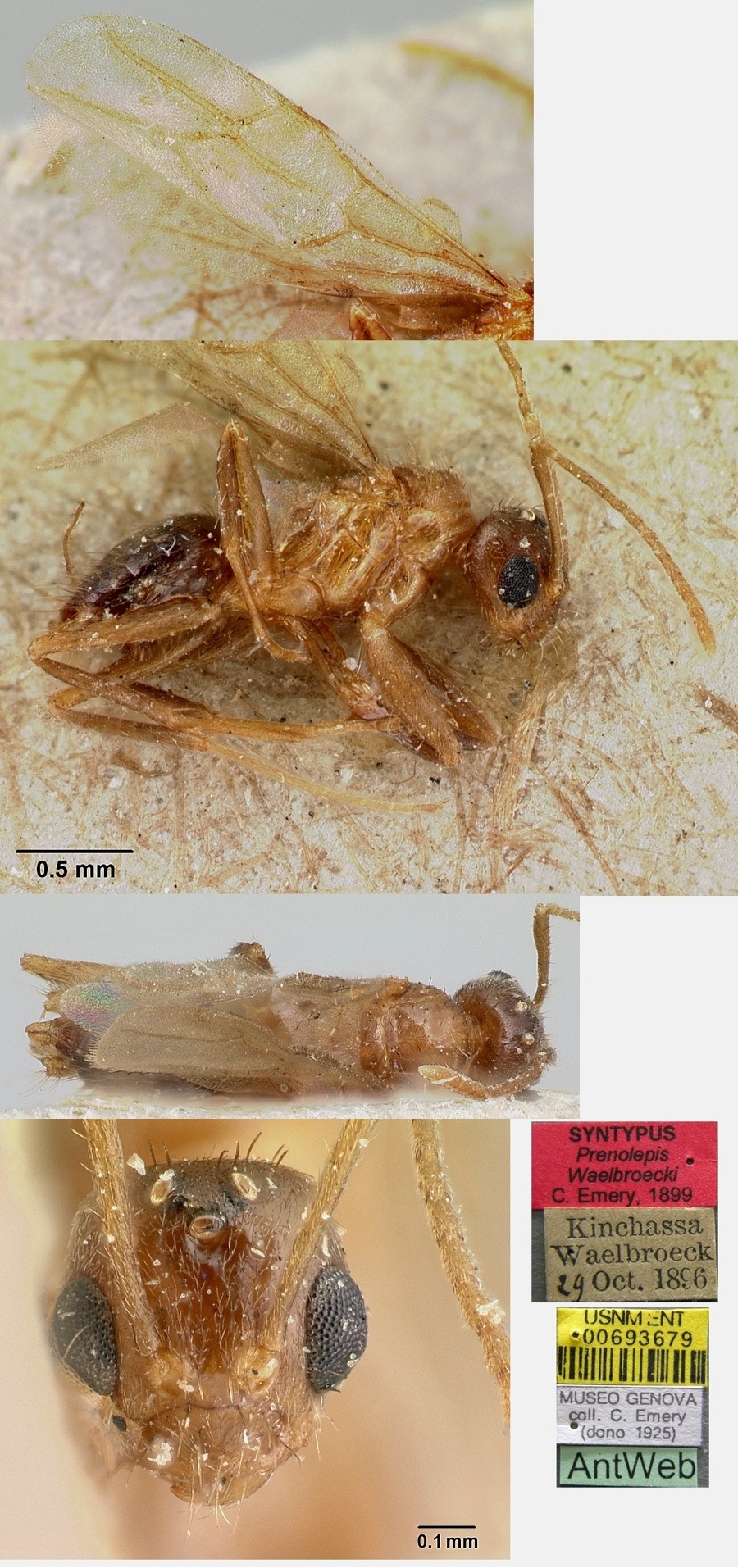Paratrechina waelbroecki (Emery)
  Type location Zaïre (Prenolepis
waelbroecki, Emery, 1899e: 496, illustrated, male genitalia, male
and female described) from Kinshasa, collected by Waelbroeck,
x-xi.1896 - male type see below. Forel (1911f: 280) reported "Prenolepis
Waelbroeki
Emery worker (??) - Congo da Lemba : MAYNÉ (Musée du Congo)"; also from
Congo da Lemba by A. Weiss (Wheeler, 1922: 943). Type location Zaïre (Prenolepis
waelbroecki, Emery, 1899e: 496, illustrated, male genitalia, male
and female described) from Kinshasa, collected by Waelbroeck,
x-xi.1896 - male type see below. Forel (1911f: 280) reported "Prenolepis
Waelbroeki
Emery worker (??) - Congo da Lemba : MAYNÉ (Musée du Congo)"; also from
Congo da Lemba by A. Weiss (Wheeler, 1922: 943).  . .
|
Emery's (1899e) description is at  . .
|
Oxford University
Museum
specimens
Paratrechina waelbroecki
B Taylor det.
Queen
|
Central African
Republic
P Annoyer
DB
|
13.i.2005
Dzanga-Sangha
04°22'19.4" N
18°35'49.7" E
|
360 m; 18h30-7h
|
1
|
 |
Paratrechina waelbroecki
B Taylor det.
Possible worker
|
Congo
E Zassi
02-t-1
|
4-5.ii.2008
Lésio-Louna
03°20'12.0" S
015°28'43.6" E
|
Village Mah; 24h
pitfall trap
|
1
|
 |
|
 The photomontage
is of a queen from the Central
African Republic, Dzanga-Sangha NP; 13.i.2005 18h30-7h 04°22'19.4"
N 18°35'49.7" E 360 m, collector Philippe Annoyer. The photomontage
is of a queen from the Central
African Republic, Dzanga-Sangha NP; 13.i.2005 18h30-7h 04°22'19.4"
N 18°35'49.7" E 360 m, collector Philippe Annoyer.
Emery (1899e)
described the queen of P. waelbroecki as ferruginous brown,
with a darker gaster; the propodeum arcing from the dorsum into a near
vertical declivity. The main negative for this association is Emery's
comment that the queen had a very shiny dorsum to the alitrunk. Emery
noted the male approached the "new species P. longicornis".
Forel (1916: 440) suggested that the workers he
described as Paratrechina
grisoni actually might be the asexual form of waelbroecki.
However, the grisoni worker is very shiny overall, a lot
smaller (TL ca 2.0 mm), and has no pubescence.
This queen appears to be a good match to the
original
descriptions.
|
 LaPolla,
Hawkes & Fisher (2012: 23) write on this
species but, despite giving "Emery, 1899: 496 (queen and male
described), note they could not locate any worker specimens from the
Forel (1911) report, and state "The queen caste is currently unknown
for this species". LaPolla,
Hawkes & Fisher (2012: 23) write on this
species but, despite giving "Emery, 1899: 496 (queen and male
described), note they could not locate any worker specimens from the
Forel (1911) report, and state "The queen caste is currently unknown
for this species".
A male is shown from http://www.antweb.org/specimen.do?name=usnment00693679
Apart
from the usual sexual differences for the genus, the male being
somewhat smaller and more slender there is nothing to suggest the queen
I report is not that of the species. |
 The
photomontage
is of a possible worker from the Congo,
Lesio-Louna, collector Eric Zassi (12-t-1). The general colour, median
carina on the clypeus and gaster pubescence are as on the male above
but the scapes do not appear to bear any erect hairs. The
photomontage
is of a possible worker from the Congo,
Lesio-Louna, collector Eric Zassi (12-t-1). The general colour, median
carina on the clypeus and gaster pubescence are as on the male above
but the scapes do not appear to bear any erect hairs.
|
|